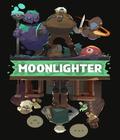Buy Moonlighter
Crawling dungeons by night and opening up shop during the day: This is the life of adventuring merchant Will in Digital Sun's Moonlighter. Originally released earlier this year for PC, PlayStation 4 and Xbox One, Moonlighter received a re-release in physical format as well as a first-time release for the Nintendo Switch. A dungeon-crawling adventure with rogue-lite and management elements makes Moonlighter an incredibly diverse game with much to do. Whereas many dungeon crawlers have us selling off loot to unknown merchant NPCs, Moonlighter shows us both sides of the adventuring coin. With the money we make, we can upgrade gear and start up town businesses to aid us in our journey. With all of the gameplay possibilities, Moonlighter keeps players engaged despite some story and mechanical inconsistencies.
We play as our protagonist, Will, who is the young proprietor of the Moonlighter shop. He is a dreamer with a fascination for adventure and the mysterious dungeons that popped up near town one day. No one knows where the dungeons came from or why they're there. They are full of mystery and treasure to taunt merchants and adventurers alike. There are five dungeons, each with their own elemental type. Secret rooms and extra challenges lie within and provide pleasant surprises for hardcore explorers as they encounter enemies and treasure. Different enemies drop different loot, with higher-level enemies dropping rarer items. There are five levels to each dungeon, and they lead up to a boss battle. Beating each boss drops a key to unlock the giant fifth door to end the game and (hopefully) understand the secrets behind the dungeons.
Moonlighter utilizes procedurally generated dungeons to test players in maintaining a delicate balance between collecting and exploring. The further we go into the dungeons, the higher chance we have of finding better treasures. Players can leave dungeons at any time by using a talisman to transport back to town. Venturing deeper into dungeons raises the cost of transportation, but that also means that enemies become more difficult the further we go. It would be a test of willpower to return to town after filling my backpack with treasure despite the desire to keep exploring. Being greedy would sometimes turn against me, however, as I would meet an untimely end. Dying in a dungeon means losing all the treasure I'd collected, forcing me to start all over again. It also meant that the Moonlighter had no stock to sell. Collecting treasure was not only part of the dungeon exploring experience, but it was necessary for upgrades to carry us further into the game.
Not only do we collect treasures to sell, but we also have a say in their sale price. Players must take into consideration the economy when peddling wares, since selling too much of an item decreases its value. Basic concepts of supply and demand are at play to help other areas of gameplay. Utilizing money earned at the store can help create start-up businesses in town, like a weaponsmith to help with gear upgrades. Money can also be returned to the Moonlighter by expanding its storage, making it more appealing to guests, and adding personal benefits to Will. For example, building him a more comfortable bed provides additional temporary health for adventuring. When selling our treasures, we're able to put a price on our risks for rewards. The financial management component in Moonlighter provides a different side to the dungeon-crawling experience that few other games offer.
While learning the formula for successful earnings helped to further progression, there were times when the gameplay felt like too much of a grind. Not only do we need money to upgrade weapons and gear, but we also need certain trinkets and components from the dungeons. I found huge disparities between upgrading gear for the first time and additional times after. It took cost 4,000 gold to build a base weapon, but its first upgrade cost 20,000 gold. Attempting to acquire such gold meant braving the dungeons over and over again to reach higher-level items. While it became relatively easy to return to higher levels of the dungeon thanks to a portal artifact we find in our adventures, it was still a constant grind.
Having to return to dungeons wouldn't be such a chore if the combat weren't so clunky. There are various weapon classes to provide a variety of combat styles, but some enemy hit boxes don't function as expected. There were times when I was certain I had hit an enemy, but no damage was done. One must get close enough to enemies so you're almost touching, but touching enemies causes damage. While attacking, I also hurt myself in the process due to getting too close. Despite this, combat had technical variances that were a welcome addition. Fans of Dark Souls will appreciate the artful dodge roll that comes naturally to our protagonist. Dodges also provide invulnerability, which can come in handy when facing quick enemies or bosses.
Each boss has a distinct character design with memorable musical themes and techniques. Exciting battles keep players engaged and searching for the four keys to unlock the fifth dungeon. Will's fascination with dungeons (almost an obsession) keeps pushing him to uncover the truth. Despite the criticisms from his mentor to give up adventuring and focus on curating the Moonlighter, Will is drawn to these dungeons. Not much is given to us in the way of story. We don't know much about Will, and we never discover the truth, despite opening the mysterious locked fifth door. It becomes a bit of a disappointment to go through so much effort to be rewarded with so little. Fans of a deep story may find that in short supply with Moonlighter.
Moonlighter creates an excellent dungeon-crawling experience for fans of the genre. It combines rogue-lite elements with procedurally generated dungeons to create an adventure that's packed with surprises. Collecting loot to sell in the store adds a new side to dungeon-crawling experience that we don't often see. Selling in the store is multi-dimensional, as we must take supply and demand into consideration. Sometimes by trial and error, we learn the true value of things to assist us in our progression. Progression can be slow due to clunky combat that causes us to die frequently, and a lot of grinding is required to achieve better upgrades. Moonlighter does an excellent job of getting the player to want to delve deeper into the dungeons, since venturing further yields greater rewards. Intricate details and visuals give Moonlighter a memorable style. Enemy designs provide an ample challenge for the risky adventurer, but the story falls short because the narrative isn't memorable.
Score: 8.8/10
More articles about Moonlighter











 Moonlighter is a 2D action/RPG with rogue-lite elements following the everyday routines of the aforementioned Will, Rynoka's ambitious shopkeeper that dreams of becoming a hero.
Moonlighter is a 2D action/RPG with rogue-lite elements following the everyday routines of the aforementioned Will, Rynoka's ambitious shopkeeper that dreams of becoming a hero.

































